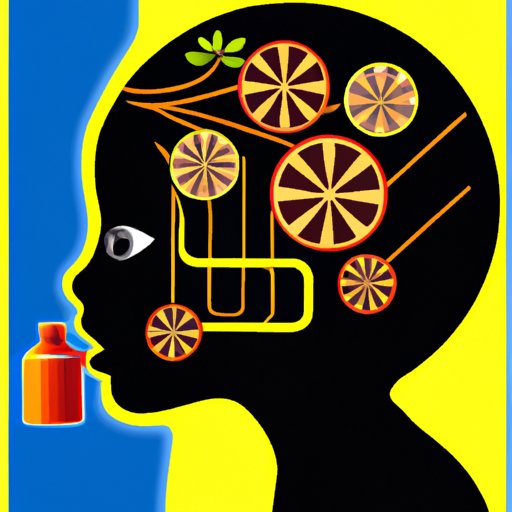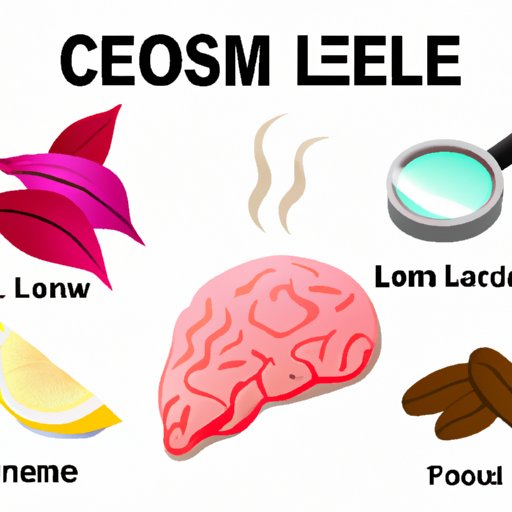I. Introduction
It’s not uncommon to lose your sense of taste and smell when you catch a cold. While it’s a temporary and usually minor issue, it can still be frustrating and sometimes even dangerous. Understanding the science behind this phenomenon can help you cope with the loss of these senses. This article will explain how and why a cold affects taste and smell, and explore remedies to regain it.
II. The Science Behind Temporary Loss of Taste and Smell
A cold virus usually attacks the body’s respiratory system, including the nasal cavity, which is key to our ability to taste and smell. The olfactory epithelium, a group of cells in the nose, contains sensory receptors that recognize different odors and send signals to the olfactory bulb in our brain.
With a cold, the virus interferes with this function, causing inflammation and congestion in the nasal cavity. When the nasal passage is blocked, the odor-carrying molecules coming in contact with the olfactory epithelium cannot travel efficiently to the olfactory bulb. Consequently, our brain receives incomplete or distorted signals, which can cause a temporary loss of smell or even lead to the inability to smell entirely. The taste is closely linked with the sense of smell, so a reduction of the latter can result in the loss of the former.
III. Coping with Temporary Loss of Taste and Smell
The temporary loss of taste and smell does not have a cure, but there are ways to manage it until it resolves on its own. During this time, it is important to adjust your daily routine to take care of these senses and keep yourself safe.
Personal hygiene is vital when you don’t have your senses. Washing your hands and food before eating provides a cleaner environment for your taste buds to absorb flavors. Home remedies like inhaling steam, using a saline solution, drinking fluids, and increasing vitamin C intake can also help ease nasal congestion and speed up recovery.
Furthermore, you can modify your diet by opting for spicier, saltier, and more aromatic foods to enhance the taste profile. However, be mindful of adding too much salt and spice, as this can result in an overstimulation of the taste buds. Eating strongly flavored foods such as pickles and lemons can also help stimulate the taste buds.
IV. When to Worry about the Loss of Taste and Smell
While a temporary loss of taste and smell due to a cold is usually a minor concern, there are cases where it is a sign of a more severe problem that requires medical attention. For instance, if you suddenly experience a total loss of taste and smell, it could be a sign of more severe issues like a sinus infection or COVID-19. These conditions usually have other symptoms like fever, coughing, shortness of breath, and loss of appetite. Seeking medical attention is necessary if you encounter these symptoms.
V. Foods to Eat and Avoid When You Can’t Taste or Smell
Making food taste good is challenging when you can’t taste it. Here are some tips for modifying your diet:
• Use bold and flavorful herbs and seasonings like basil, garlic, cinnamon, and mint to enhance the food’s taste profile.
• Opt for stronger-tasting foods such as pickles, sauerkraut, olives, kimchi, etc.
• Avoid extremely sweet or bitter foods, which can overwhelm the taste buds more than usual.
VI. Other Health Conditions That Might Cause Taste and Smell Loss
The temporary loss of these senses is usually due to colds, flu, or respiratory infections. However, other conditions can also cause long-term alterations such as nasal polyps, nasal obstruction, allergies, head injuries, and chemical exposure. Consult your doctor if you face these ongoing symptoms, and they may refer you to a specialist.
VII. The Connection between Taste and Smell during a Cold
The sense of taste and smell is closely tied, as 80 percent of what we perceive as taste is based on the smell. The aroma of food tells us what a particular dish will taste like even before we eat. When the nasal airflow is interrupted due to a cold, it interferes with our sense of smell and taste.

VIII. Innovative Remedies for Regaining the Sense of Taste and Smell After a Cold
There is no approved medical treatment to regain the sense of taste and smell after a cold. However, some remedies may have the potential to help:
• Olfactory training: It comprises inhaling essential oils of specific scents, such as lavender, peppermint, and eucalyptus, for 20 seconds, twice daily for weeks or months. This helps stimulate the sensory receptors in the nose and recover lost senses.
• Zinc supplementation: Consuming foods rich in zinc or taking a zinc supplement such as lozenges can shorten the length of cold and alleviate symptoms, including taste and smell loss.
IX. Conclusion
In a nutshell, the loss of taste and smell are extremely common issues faced during a cold. Understanding the science behind it, and incorporating small remedies like inhaling steam, eating flavor-packed food, and taking vitamins can help cope up with the same. However, if a significant change persists in taste or smell after a cold, medical attention is urgently needed as it could be a sign of a medical condition.
It is essential to note that while losing taste and smell can be frustrating, it is temporary most of the time, and things will eventually return to normal. With a positive outlook and the proper precautions and remedies, you will get your senses back in no time.
